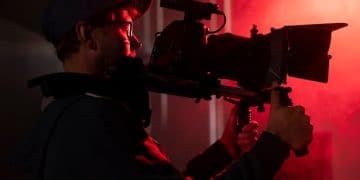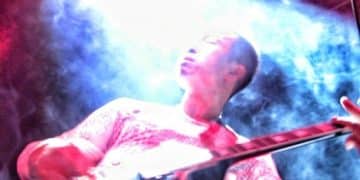Book Your First National Tour: A Guide for Emerging Rock Artists

Emerging rock artists can book their first national tour by building a strong local following, networking with industry professionals, creating a compelling press kit, diligently researching venues and markets, and effectively pitching their music and show to promoters and booking agents.
Embarking on your first national tour as an emerging rock artist is a significant milestone. This step-by-step guide will provide you with the essential knowledge to navigate the complexities of booking a tour, from crafting your pitch to securing the right venues.
Laying the Groundwork: Building Your Foundation
Before even thinking about hitting the road, emerging rock artists need to establish a solid foundation. This involves building a strong local presence, crafting a compelling narrative, and understanding the logistics of touring.
Establish a Local Presence
Your local scene is your training ground. Gaining traction in your hometown or region is crucial before expanding nationally. This helps you refine your performance and build a fan base.
Craft Your Band’s Narrative
What makes your band unique? Define your genre, your mission, and your story. This narrative will be the backbone of your press kit and your pitch to promoters.

Here are key elements to address while creating your band’s narrative:
- Genre Definition: Pinpoint your sound. Are you alternative rock, indie rock, hard rock, or something else entirely?
- Unique Selling Proposition: What sets you apart? Is it your unique songwriting, energetic live shows, or a specific message?
- Band’s Story: Share your origins, influences, and aspirations. Authenticity resonates with fans and industry professionals.
Building a strong foundation involves strategic planning and dedication to craft your band’s image and sound. Remember, this groundwork is what will underpin your efforts as you move towards booking a national tour.
Creating Your Tour Pitch: Essential Materials
Once you have a solid foundation, you need to package your band in a way that appeals to promoters and booking agents. A well-crafted tour pitch is essential for attracting attention and securing bookings.
Building Your Electronic Press Kit (EPK)
Your EPK is your digital resume. It should include high-quality photos, your bio, music samples, videos, and any press you’ve received. Make it easily accessible online.
Crafting a Compelling One-Sheet
A one-sheet is a concise summary of your band, designed to grab attention quickly. Include your best photos, most impressive accomplishments, and contact information.

The essential elements to include when crafting your tour pitch are:
- High-Quality Photos: Professional photos showcase your band’s image and stage presence.
- Professional Video: A live performance video or music video is a must-have. Quality matters.
- Strong Press Quotes: Positive reviews and testimonials add credibility to your pitch.
The EPK and one-sheet are crucial tools to showcase what your band offers to potential promoters and booking agents. By meticulously assembling these materials, you enhance your chances of securing shows and advancing your career.
Research and Targeting: Finding the Right Fit
Effective tour booking involves strategic research to identify the right venues and markets for your music. Understanding your target audience and geographic reach is important.
Identifying Target Venues
Research venues that align with your genre and band size. Consider capacity, sound quality, and reputation within the local music scene.
Understanding Your Target Market
Where does your music resonate most? Identify cities and regions with a strong fanbase for your genre. These are your prime targets.
Important tactics to employ when identifying the target venues are:
- Online Research: Use websites and social media to find venues that host similar bands.
- Networking: Talk to other bands and industry professionals for recommendations.
- Market Analysis: Analyze data on music consumption and concert attendance in different regions.
Proper research and targeting are crucial for your tour success. By identifying venues and markets aligning with your music, you improve your chances of connecting with your audience and achieving a profitable tour.
Networking and Outreach: Building Connections
Networking plays a vital role in the music industry, especially when booking a tour. Building solid relationships with promoters and booking agents is essential.
Attending Industry Events
Conferences and showcases provide opportunities to meet industry professionals face-to-face. Be prepared to pitch your band and make lasting connections.
Leveraging Social Media
Engage with promoters and venues online. Follow them, comment on their posts, and demonstrate your interest in their work. Use it as a tool to show you’re relevant.
Ways to build meaningful connections in the music industry include:
- Personalized Outreach: Avoid generic emails. Customize your message to each contact, showing that you’ve done your research.
- Follow-Up: Don’t be afraid to follow up after initial contact. Persistence can pay off.
- Relationship Building: Nurture your relationships. Stay in touch with your contacts even when you don’t need anything.
Networking and outreach are ongoing efforts that require patience and persistence. As you nurture these connections, you fortify your position in the music industry, opening doors to future collaborations and tour opportunities.
Negotiating and Securing Bookings: Making It Official
After securing interest from venues or promoters, finalizing the booking is a critical step. Negotiating terms and working out contracts is important.
Understanding Contracts and Riders
Familiarize yourself with standard contract terms. Pay attention to details like payment terms, cancellation policies, and hospitality riders, and ask about any additional fees.
Negotiating Fair Deals
Know your worth. Be prepared to negotiate your fee based on your draw, expenses, and the venue’s capacity. Also have a plan in case the outcome is not what you expected.
Key points to consider when negotiating and securing bookings:
- Clear Communication: Ensure that all terms are clearly defined in writing.
- Flexibility: Be willing to compromise to reach a mutually beneficial agreement.
- Professionalism: Maintain a professional attitude throughout the negotiation process.
Negotiating and securing bookings are the final steps in making your tour official. Your goal is to establish clarity to avoid surprises. By entering into bookings with confidence and clarity, you are set for a successful tour.
Tour Logistics and Promotion: Ensuring a Smooth Run
With your tour booked, the focus shifts to logistics and promotion. Careful planning and execution are key to a successful and enjoyable tour.
Planning Your Route and Schedule
Optimize your route to minimize travel time and expenses. Create a detailed schedule that includes travel days, show days, and rest days.
Promoting Your Tour
Use social media, email marketing, and local media to promote your shows. Create eye-catching posters and online ads.
Ensure a smooth tour by considering:
- Budgeting: Plan expenses for gas, accommodation, food, and marketing.
- Travel Arrangements: Coordinate transport for your band, crew, and equipment.
- Contingency Planning: Prepare for unexpected issues like vehicle breakdowns or illness.
By planning, executing logistics and promotional activities with precision, you increase your tour’s chances of being enjoyable, but successful. Taking care of every element will contribute to a fulfilling tour experience full of professional and personal growth.
| Key Point | Brief Description |
|---|---|
| 🎸 Build Foundation | Grow local fanbase and craft your compelling band story. |
| 🎶 Create Tour Pitch | Assemble EPK with photos, videos, and press quotes. |
| 🗺️ Research Venues | Find spots matching your genre, size, and audience. |
| 🤝 Network/Outreach | Connect with industry pros and personalize emails. |
Frequently Asked Questions
▼
An EPK, or Electronic Press Kit, contains your band’s bio, photos, music, videos, and press coverage. It’s crucial because it’s how you present a professional image and provide essential information to promoters.
▼
Start planning at least 6-9 months in advance. This allows ample time for research, contacting venues, securing bookings, and promoting your tour effectively.
▼
Consider the size, sound quality, location, and vibe. Does it suit your genre and attract your target audience? Read reviews and, if possible, visit it to assess its fit.
▼
Use a multifaceted approach: social media campaigns, email newsletters, local media outreach, and eye-catching posters. Engage with fans online and create incentives for sharing.
▼
Have a contingency plan. Contact your network for alternative venues. Communicate with fans and offer refunds if necessary. Document everything and learn from the experience.
Conclusion
Booking your first national tour as one of the emerging rock artists is no small feat. With thorough preparation, savvy promotion, and unwavering dedication, it’s more than achievable. Embrace the journey, connect with fans, and let the music lead you.





